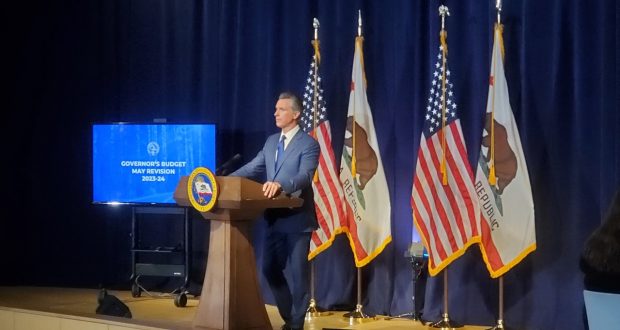By Antonio Ray Harvey | California Black Media
Last week, Gov. Gavin Newsom released the “May Revision” of his Fiscal Year (FY) 2023-24 budget proposal that he submitted in January.
Despite a $32 billion projected shortfall, the $306.5 billion spending plan protects key investments in priorities that matter most to Californians, Newsom said. Education, health care, housing and homelessness, public safety, and climate action are among key focus areas.
“In partnership with the Legislature, we have made deep investments in California and its future – transformative efforts that will benefit generations of Californians, and that this budget will continue to guide as we navigate near-term ups and downs in revenue,” Newsom said during a two-hour news conference held near the State Capitol on May 13.
“As we prepare for more risk and uncertainties ahead, it’s critical that we keep the state on a solid fiscal footing to protect Californians and our progress in remaking the future of our state,” he continued.
Newsom says he does not foresee a recession but recognizes increased risks to the budget since the first month of 2023.
The plan reflects $37.2 billion in total budgetary reserves, including $22.3 billion in the Budget Stabilization Account. Highlights include:
- Billions to continue implementing expansion of health care access and reduce costs measures for programs such as CalAIM to transform Medi-Cal, extending health care to low-income Californians of all ages regardless of immigration status.
- Maintains billions of dollars for aid to local governments, encampment resolution grants, and more to address homelessness.
- Adopted a legally binding goal that local governments must plan to build approximately 2.5 million new homes by 2030, and 1 million of these units must be affordable housing.
- Advancing a $48 billion multi-year commitment to implement its world-leading agenda to achieve carbon neutrality by 2045, protect communities from harmful oil drilling, deliver 90% clean electricity by 2035, and more.
- Investing $1.6 billion for all students, regardless of income, to access two free school meals per day – up to 12 million meals per day statewide.
“With the May Revision, the Governor is again putting money where his mouth is — and where California needs to be — investing in bold and transformative proposals to advance equity and address pertinent disparities in Black communities and in the classroom,” said Assembymember Lori D. Wilson (D-Suisun City), chair of the California Legislative Black Caucus (CLBC).
Wilson applauded the “accountability measures” in the budget that “leverage the entire $80 billion in Local Control Funding Formula to focus on low-performing student groups and schools, and require districts to publicly identify and address where Black student performance is low, while providing additional services at high-need schools using the complementary $300 million Equity Multiplier are what the Black Caucus has been fighting for – for years.
During the press conference, Newsom also addressed repreparations payments, a potential budget issue that could come to the forefront soon. The California Task Force to Study and Develop Reparation Proposals for African Americans will submit its final report to the legislature on June 29 in Sacramento.
Among other proposals, the nine-member panel recommends a formal apology from the state of California that lessens the gravity of circumstances that historically caused hardships for the Black community.
In addition, the panel suggests that descendants of slavery living in California should be entitled to receive up to $1.2 million in compensation.
Last week, reports surfaced that Newsom said he would not “endorse” direct cash payments to Black Californians based on a statement he made last week about broadly advancing equity and inclusion. Newsom clarified his comment.
“My posture is that let me receive the final report, continue to work with legislative leaders and the task force and assess where to go from there,” Newsom told California Black Media. “We put out a statement that was amplified, no small part by Sen. (Steven) Bradford and Assemblyman Reggie Jones-Sawyer and others. We look forward to reviewing the details of the task force’s recommendations.”
After July 1, the panel’s two-year charge will end, and state lawmakers will have the opportunity to consider the proposals for legislation. The final report is expected to be about 1,000 pages,
The final meeting for the Task Force is June 29 in Sacramento.
Responding to the Governor’s budget proposal, California Republicans criticized Newsom’s and California Democrats’ “reckless policies.”
“Today’s massive $32 billion budget deficit should be a wakeup call to all Democrats that after years of increased spending, they should have better results to point to than an outrageous cost of living, surging crime, rampant homelessness, a fentanyl crisis, failing schools and inadequate water storage,” said California Republican Party Chairwoman Jessica Millan Patterson. “Now is the time for smarter policies and responsible spending that California Republicans have long advocated for.”
Despite the looming deficit, Sen. Steve Bradford (D-Inglewood), CLBC vice-chair, remains confident.
“As a person who was here in the Legislature during the state’s worst economic crisis since the Great Depression, I know we have the skills, the know-how, and the resolve to address this budgetary shortfall and keep California moving forward,” he said.
 Westside Story Newspaper – Online The News of The Empire – Sharing the Quest for Excellence
Westside Story Newspaper – Online The News of The Empire – Sharing the Quest for Excellence





